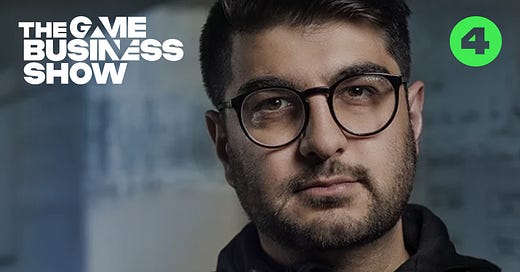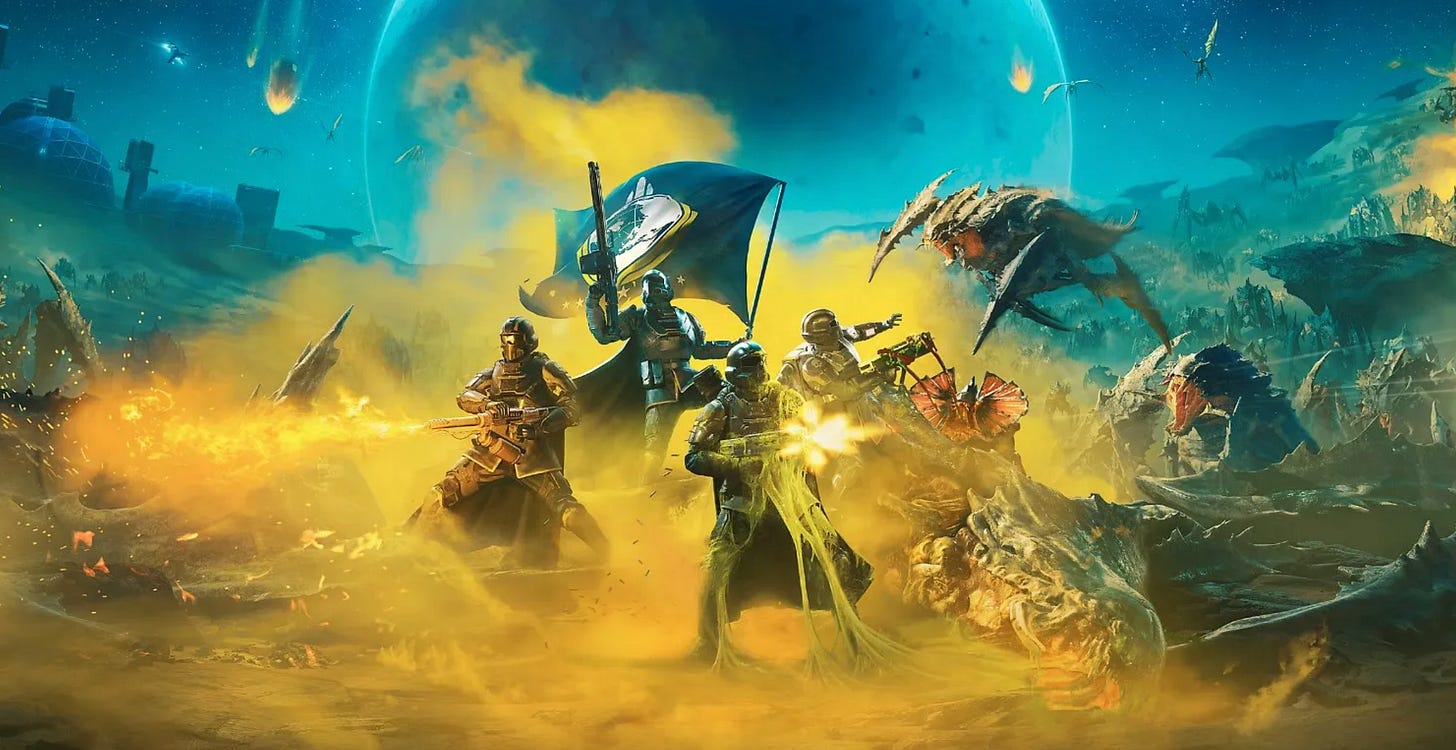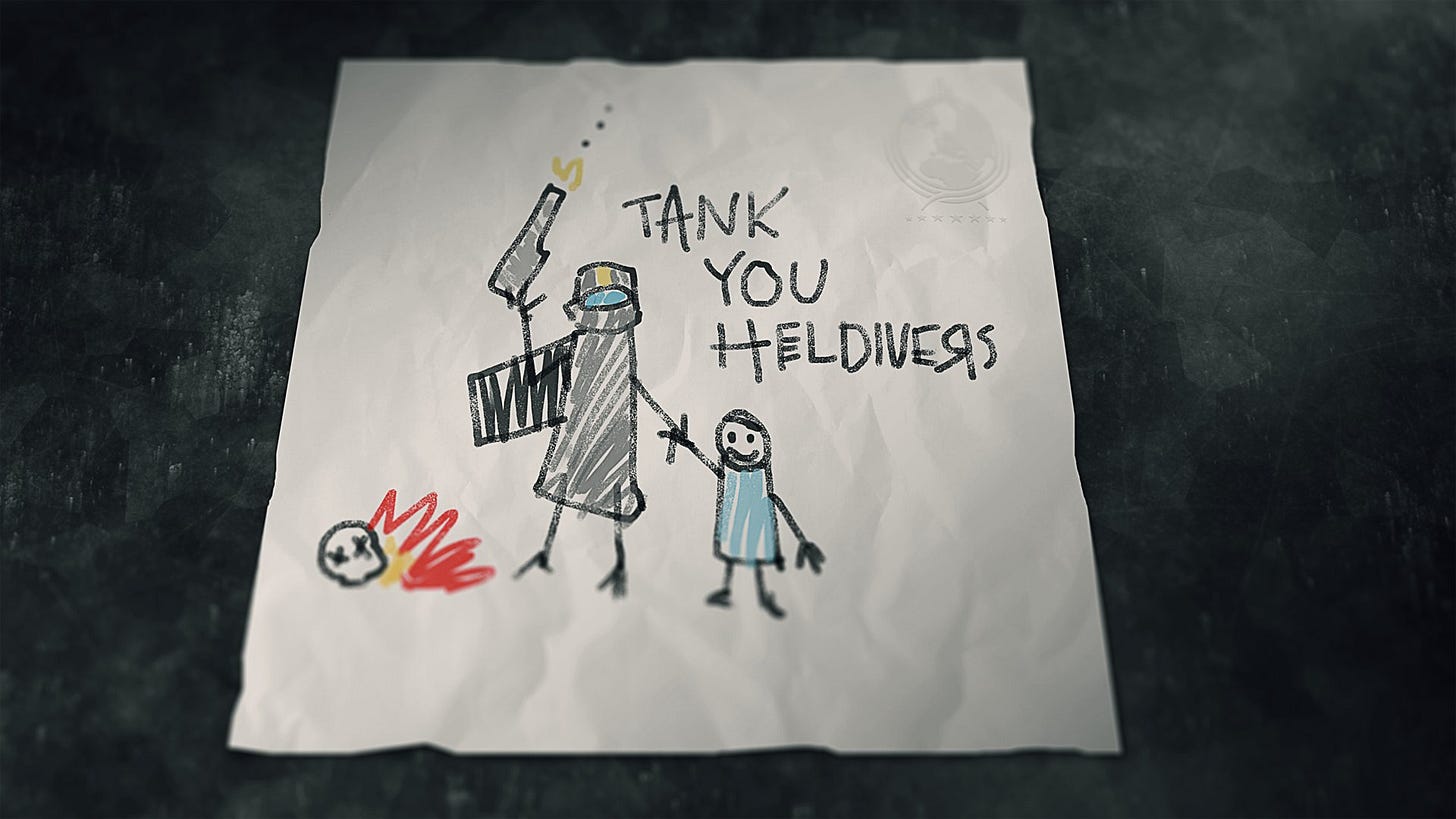Listen now on Apple, Spotify or YouTube
In This Edition
- How Helldivers 2 nearly lost it all after a huge launch
- What it took to turn things around
- Success in a challenged live-service market
- What it’s really like having PlayStation as a publisher
Welcome back to The Game Business Newsletter and Show. You’re looking great today. We kick off this week with an interview with Shams Jorjani, the CEO of Helldivers 2 developer Arrowhead. This is a truly fascinating story of a spectacular high, a crushing low and a stunning comeback… all in the space of nine months. I hope you enjoy it.
It’s the summer of 2024 and Hermen Hulst, the CEO of PlayStation’s Studios business, is worried.
In February of that year, PlayStation had published one of 2024’s biggest surprise hits. Helldivers 2, developed by independent Swedish developer Arrowhead, had shifted more than 12 million copies in three months, making it PlayStation’s fastest selling video game. At one point it had 750,000 active users online at one time.
But things had gone awry. There was controversy around mandated PSN account linking (which was later rescinded), and updates to the game had angered fans. Player count tumbled to a fraction of where things were just a few months earlier, and the Steam user score collapsed to 19%.
“Games that get 19% user score do not generally recover,” admits Shams Jorjani, the man who became CEO of Arrowhead in May last year.
Things were in a bad spot, and what’s worse, there was nothing that Arrowhead could immediately do to fix it.
“When I was asked to step in [as CEO], they gave me the keys to the car… and told me: ‘we're going off on vacation, because we haven't been taking much over the last few summers. And I was like: ‘we're running a live service game, people can't be off for the next three months!’ But that's what happens in Sweden. We take our summer vacations very seriously.”
That’s when Hermen called.
“Maybe the lowest point during my tenure so far. I had to explain to the CEO why things were in the state they were, and what we were going to do to recover. And I had to say the awkward truth that there is nothing we can do in the short term. But in the long term, we have plans that will get us back on track”
“We did not make Helldivers for six million Call of Duty players. But six million Call of Duty players bought our game. And they are interested in different things compared to, say, the audience that comes from Escape From Tarkov or Arma”
What followed was a 60-day plan and a constant stream of updates that won the fans around, taking the user score from 19% to 94%.
“I was inspired by No Man's Sky and the team over there,” Jorjani says. “They had a similar journey. The game was hyped, then bombed, and then they put the head to the grindstone and just updated the game.”
The constant improvements, combined with a significant update to the game in December (plus wins at The Game Awards) drew the fans back in a big way. Helldivers 2 achieved 250,000 concurrent players during that month, and the mood around the game remains positive.
What went wrong?
“The real challenges has been to maintain our integrity,” Jorjani tells us. “The slogan for the studio is that ‘a game for everyone is a game for no one’. We did not set out to design Helldivers for a wide audience. But if you make an uncompromising game experience for a very specific audience, you have the ability to resonate far outside of it. We've seen this happen many times in video games and even outside the games. From Software were very brutally hard when every other game was about hand-holding, and now there’s an entire genre born out of that.
“So we did not make Helldivers for six million Call of Duty players. We absolutely didn't. But six million Call of Duty players bought our game. And they are interested in different things compared to, say, the audience that comes from Escape From Tarkov or Arma, which were some of our more influential games.
“So ‘the summer of pain’, or whatever we want to call it, was painful in part because it was hard for us to reconcile how to stay true to the studio fundamentals, while dealing with the business realities of having so many different voices screaming at us.”
This is a common issue most live service games face, but it was a new challenge for Arrowhead who were not a fully-fledged live service studio.
“We were the same people we were 12 months ago. But suddenly we're in a different league. We were playing like in Division Three and now we're in Champions League. And it takes time for us to figure that out. We are being scrutinized against a different standard. We need to rise to the occasion. But there's a bit of a lagging effect to that as we catch up.”
He adds: “The thing that had us lost was that we got away from the core fantasy of [Helldivers]. It literally says on the box, ‘kill monsters with overpowered weapons’. And in our strive to find balance, we ended up balancing the game in a way where the core fantasy died, and that's why we got the backlash.”
“I know what happens when there is uncontrolled, very rapid growth. It can lead to disastrous effects.”
Despite the demands of so many voices, Jorjani won’t expand Arrowhead significantly. Ultimately, he says, there’s no keeping up with the requests, pointing to a conversation he had with the Genshin Impact team.
“They have 1500 developers working on stuff, but it's still not enough for the players. Despite us dropping really cool updates, new factions and weapons… we just can't keep up. Nobody can.”
The studio has expanded a bit, and is working with co-development partners to increase its output, but Jorjani is mindful to grow cautiously.
“From my history, I know what happens when there is uncontrolled, very rapid growth. it can lead to disastrous effects.
“I want us to be a role model for how to do sustainable growth, because the industry today is not in a good place. A lot of companies are shedding a lot of jobs. And it's not the people at the top that are losing their jobs, it's people who have moved half across the world to take jobs. And that’s because of bad growth decisions made by business leaders who have taken stupid risks.”
Live service masters
One thing that helps Helldivers 2 when it comes to keeping players engaged is its Game Master feature, where there’s someone in the studio influencing and observing in-game events. And this feature has kept players returning.
“[Earlier today] a planet in the game was blown up,” Jorjani explained. “This planet was the first one that opened up when the game was launched, and now it doesn't exist as a result of a number of different events that were in the hands of the players.
“I did not anticipate how much people would lean into the role-playing aspect of this. And there've been a couple of stories throughout the year that have been truly moving. We issue challenges to the players, like ‘take this planet and you'll get this reward’. And the reward is these anti-tank mines. The players tried to take the planet and failed. And then three weeks later, we were like: ‘here's another planet. You take that and the arms factories, you get the anti-tank weapons. And again, they failed. ‘
“Then we issued a similar challenge: ‘You can get the mines If you take this planet, or you save this other planet that has sick kids in a hospital, but you can't save both. It's up to you, the community, which one do you save?’ And the community overwhelmingly chose to get the sick kids. Digital, fictitious kids in this fascist, super society. But everyone role played the fantasy and we made the donation to Save The Children.”
Events like this continue to entice players back in.
“With this planet [exploding], our concurrent player count jumped by 30,000, who just logged in to see what the hell was going to happen. I did not think that we would see this level of engagement or retention, if you want to use those business terms. Truly people are passionate about what's happening, thanks to this Game Master feature.”
I had to go back to that call with Hermen Hulst. PlayStation has put a lot of focus on finding live-service games to sit alongside its classic, single-player titles. That’s why it acquired Bungie in 2022. But it’s a challenging area, as highlighted by Sony’s own Concord, which failed to find any audience when it released last August.
So Helldivers 2 marks an important success story for PlayStation, and you’d expect it to be hands on in order to capitalise on the game’s unexpected popularity.
“I came into this thinking that the relationship with PlayStation would be quite different,” Jorjani admits. “I assumed with Sony having paid a lot of money for this project that they would run the show, more or less. Because what do these wild kids here in Sweden know? But I've been very pleasantly surprised to see how creator friendly PlayStation has been. Truly, truly impressive.
“There have been fumbles, as any company does. But they've been an amazing partner throughout. They get a bit too much flack from the community at times. Helldivers wouldn’t exist if PlayStation was not so focused on creating cool stuff for players.”
SHAMS JORJANI’S THREE LEARNINGS FROM HELLDIVERS 2
Eat Your Own Dogfood
“We talk to the community all the time. We read what they post, we play the game and we stay in touch with them. They pay our salaries. We succeed the most when we give players what they want, but I will balance this out with… we have a lot of different voices.
“I see this fumbling happening in the industry quite often. And this has comes back to PlayStation’s strength as a partner. Sometimes there are strategic directives from big companies that say ‘you have to do this because x, y, and z.’ The directives that we are being given are the same desires that we have, and that we see mirrored in the wants of our players. If you're trying to put lipstick on a pig and sell it like something else, that's when you run into trouble.”Don’t Take Yourself Too Seriously
“One of the reasons we get away with screwing up from time to time, is that we show people that we're still human. Sometimes we have good days and sometimes we have bad days. And if people understand that there are humans on the other side, there's a little bit more understanding. And I think that we've built goodwill and trust that even if we fumble, they’ll know we’ll still do right by them.”Grow Sustainably
“I wish that our industry hadn't shed almost… 30, 40, 50,000 jobs over the past two years. A lot of people at the top were making very unsound business decisions, and there's very little accountability on their part. Who among these executives is stepping down? Or slashing their salaries?
“What's happening is that regular developers, are paying the cost of that. That's a terrible way to run our industry. Just because you can hire and triple in size in six months, doesn't mean you should. Or that it's the best thing for the studio's long term business health.
“I'm not saying don't grow, but do it in a way where you don't have to then let go of one third of the company because you made stupid decisions. I’m not going to hire a hundred people., I would like to do that and help people in the industry, but my first priority is to make sure that people have jobs for many years.”
Thank you for reading (or listening, or watching). Join us later in the week for the reveal of Nintendo Switch 2. Thank you to Shams Jorjani for his time, and also to our producer Richard. Thank you to Kieran Love for The Game Business Show theme.












Share this post